The Three Biggest Communication Mistakes
Jan 03, 2018
If I could give every practitioner one rock star talent in treating clients you know what that would be? The ability to communicate better.
Listen to this Podcast
Stream this episode
SUMMARY
If I could give every practitioner one rock star talent in treating clients you know what that would be? The ability to communicate better.
When I first started out, I wouldn’t talk to clients much during treatment, and at the end of the session I would say “Ok see how you go and call if you need us”. Disastrous communication!
But why? Why was I communicating like that?
I didn’t want to appear pushy with the client; I also had massive amounts of fear that the patient didn’t get anything from the treatment. But really if I dig a bit deeper the real reason was that I wanted accolades, and I didn’t want to ask directly for them. Because that would be weird!
We don't want to ay to clients, "Please can I have an encore?"
We just want people to say, "Encore! Encore, that was so wonderful, of course, I'm going to come back."
So say, "See how it goes.", Because what we want them to say in reception is, " Can I see him tomorrow? That was amazing, life changing! He is the best"
Accolades swell our ego and give us some external validation.
It took me many years to get out of that habit of seeking that external validation.
Now from a client’s point of view they will not be thinking
“Wow what a kind, un-pushy considerate person.”
What they will be thinking is
“Where to from here? Did that guy even know what he was doing?
Your clients need confidence that you know what your doing.
Also, don’t fall into the trap of not explaining what you are doing. You want to tell what you are doing to the client and why. This draws the client into the treatment and helps them take ownership of their healing process.
Lastly, a big part of communication is teaching, and not every client will learn the same way. Some are visual, some auditory, some learn with examples, and most customers will be a mixture of all of these.
Learning to be a good teacher takes practice but communicating with your client is the first step.
The three main points to take from this are:
1. Communicate with your customers, talk to them while you treat them. Describe what tissues you're working on and why.
2. The second one is to paint that visual picture or to use real pictures, spine or a skeleton and point out on your body what you are treating on your client’s body.
3. The third one is rebooking. Be precise. Don't be vague. Don't get into your own mindset, or the belief that rebooking is suggesting you are pushy or not good at what you do. Just rebook them.
"Mrs. Jones, I'd like to see you in a week's time when we're going to work on X. Until then I’d like you to do Y and like you not to do Z."
Then take them out to reception, and you are done.
Related quotes to consider:
[Follow Jonathan on Instagram for tons of great quotes]
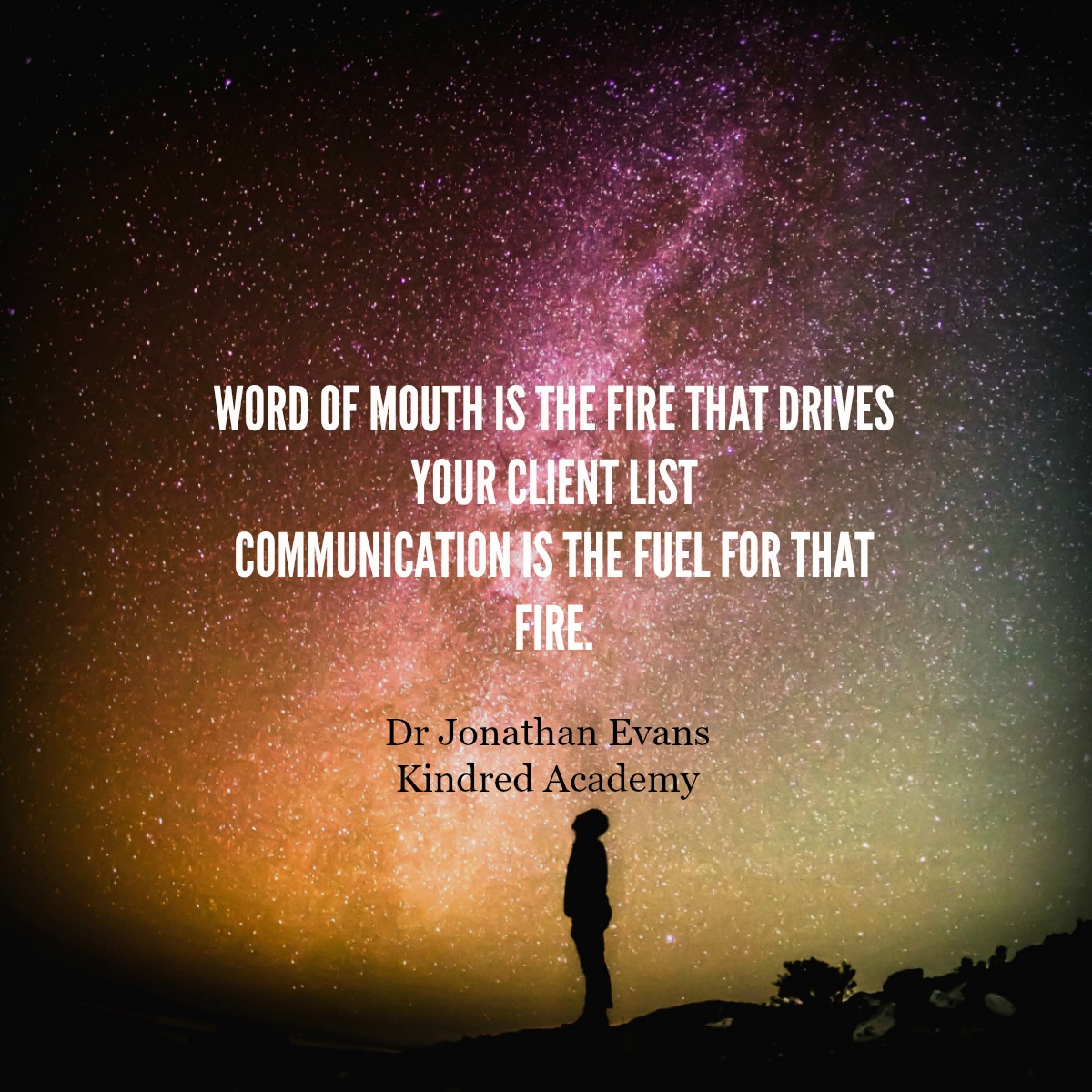

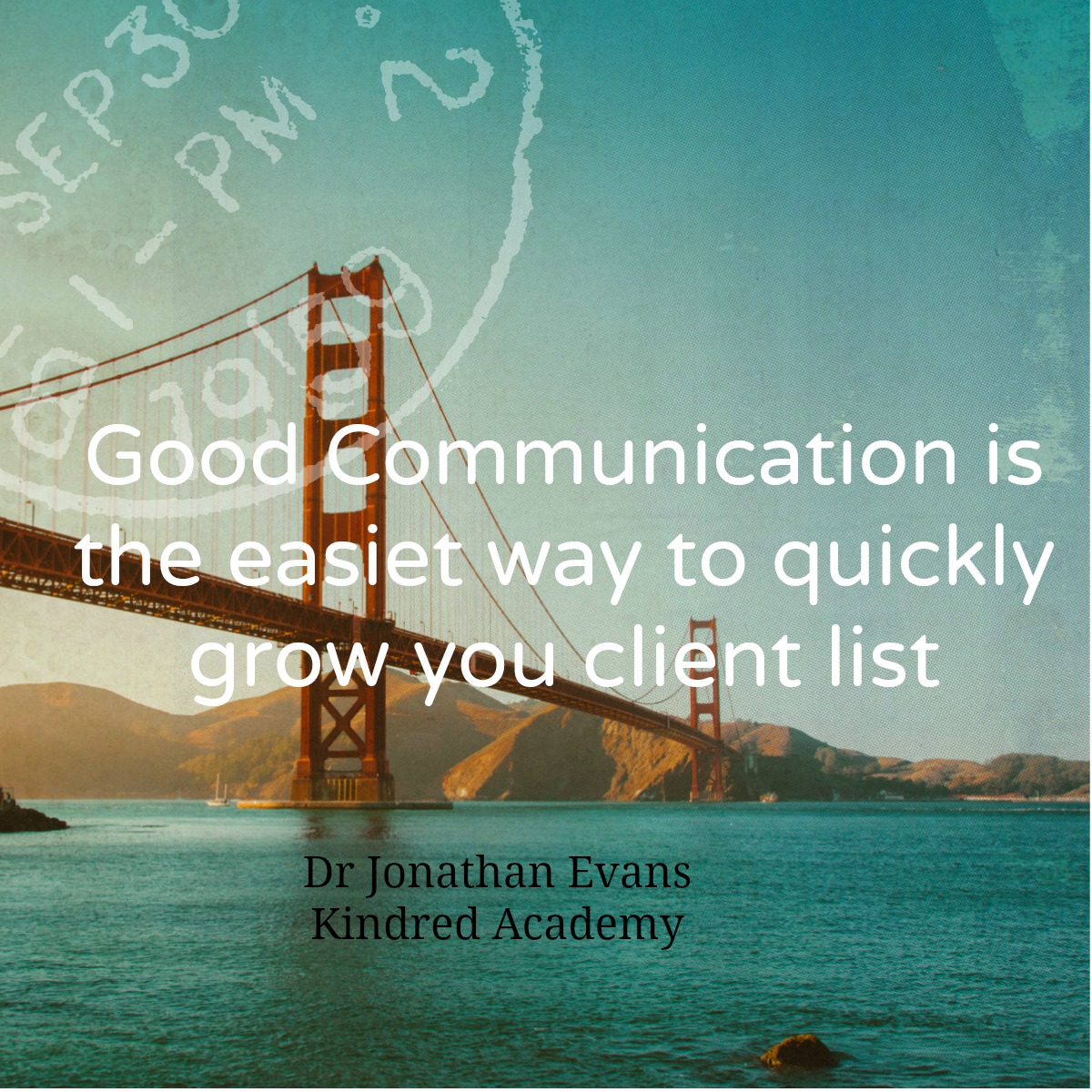
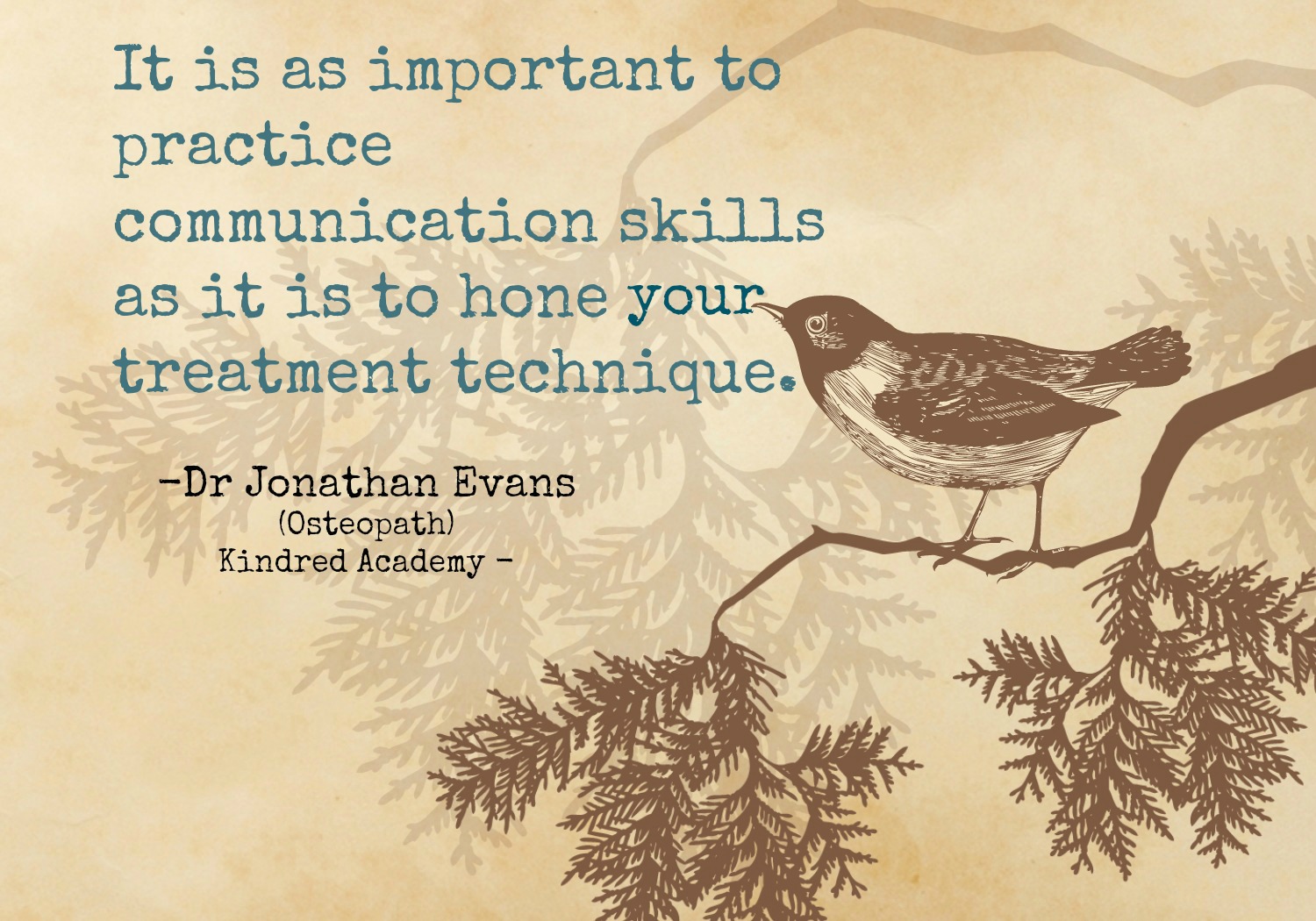
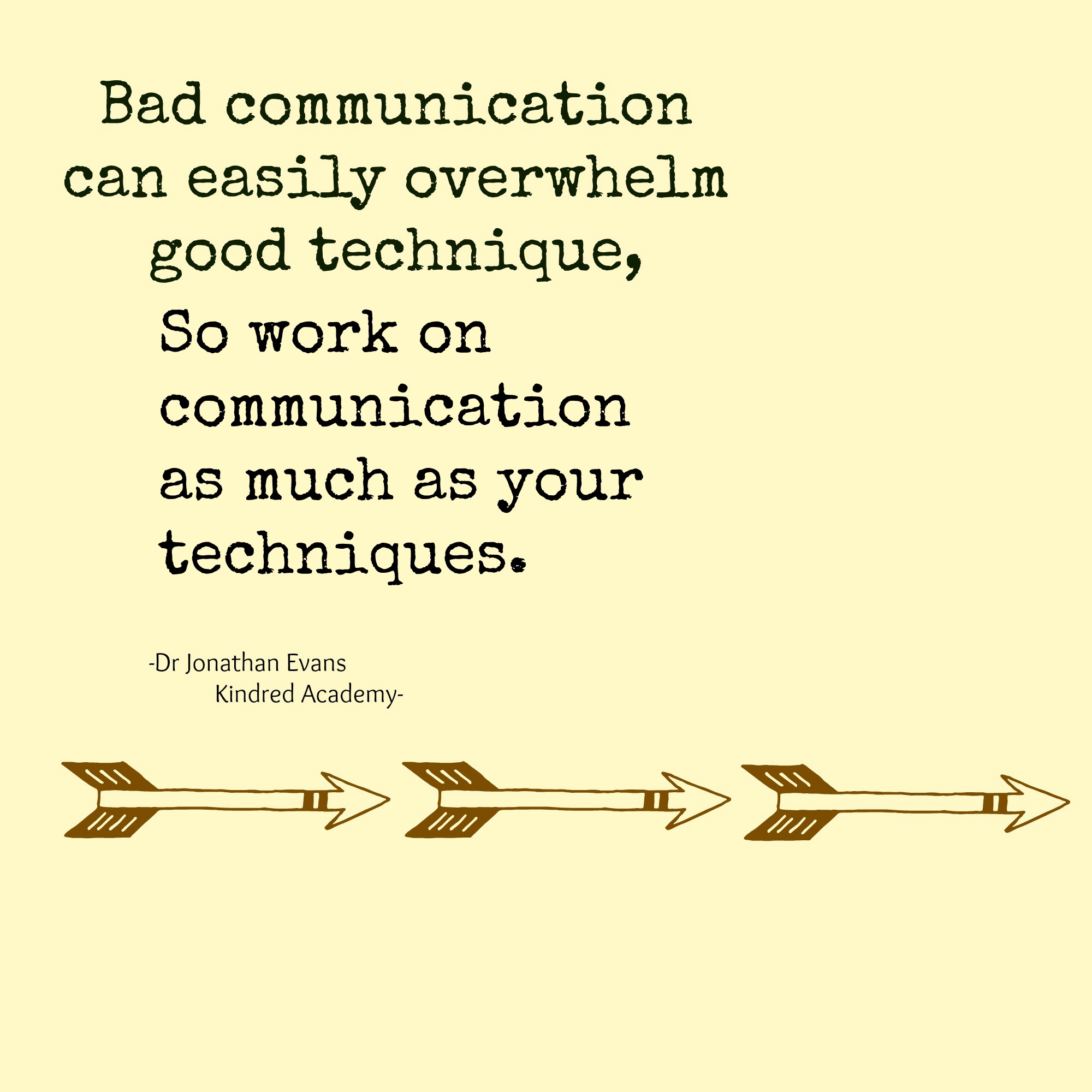
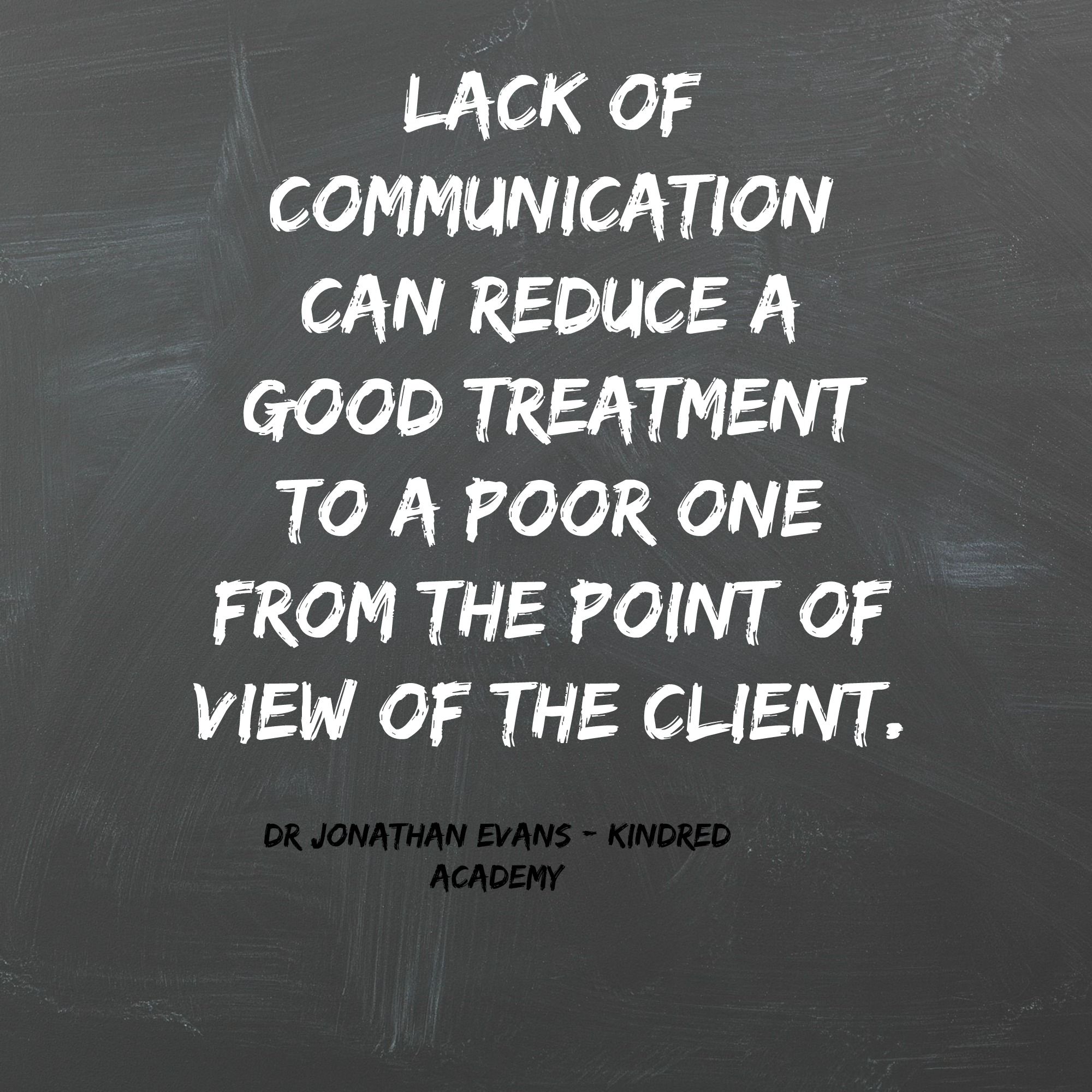
FULL TRANSCRIPT
If I could wave a magic wand and give all practitioners just one skill, then that skill I would give them wouldn't be to have more healing hands or a certain technique, it would just simply be the skill of communication. I'll explain why. It's a topic that's really dear to my heart because I spent many years being such a bad communicator.
When I started off as practitioner, I said daft things. First of all, I wouldn't talk to patients very much. Then when it came to the end of treatment, I'd be like, "See how it goes. Give us a buzz when you think you need another treatment." I mean disastrous communication. If you ever catch yourself doing that, stop immediately. The reason why it's disastrous communication is it comes from one place, but it actually gets received as something completely different.
We say that because we don't want to be pushy with the patient. Really, if we look deeper within that, why I said it, and perhaps the reason why you might say it, is because we want to be loved, we want to be respected, we want people to shower us with their accolades. We don't want to be asking for those accolades, "Please can I have an encore?" We just want people to say, "Encore! Encore!", Stand up, "Encore! Encore! That was so wonderful, of course, I'm going to come back." We just say, "See how it goes.", Because what we want them to say in reception is, "Can I come back next week? Can I see you tomorrow?", Because that swells our ego and gives us external validation. That's really why I said those things when I started out. It took me many years to get out of that practice!
Now, that's where it comes from, but how is it perceived by a patient? It isn't perceived as us not being pushy, and us being, "Oh see how it goes.", And being kind and considerate, and not trying to ram it down their throat. It's perceived by the patient as, You don't actually know what you're doing. If you went to see a specialist in any field and they went, "See how it goes.", You'd think, "That guy's a specialist? No way! They don't know what they're doing." You expect them to say, "Do this, this, and that." You may not follow that advice, but you expect someone, as a specialist, to give you their advice and their opinion. That's an area where we fall down a lot in. We don't communicate because of our inner beliefs about not wanting to be pushy or disliked or unpopular.
We're also bad communicators in terms of actually explaining to patients what's going on with the treatment. Sometimes we just get stuck into our work, and we concentrate, and we don't want to talk. Certainly, you don't want to be talking, too much about the weather, or what's on television. You can do that, initially, in terms of building rapport, but when you're treating, you want to be focusing on what you do.
But you can still talk and communicate, you simply communicate about what you're doing. "Okay. I'm going to work on the hip, here, because I think there's a little bit of holding through the muscles on that side, and I think that's coming up and influencing what's happening when you do that certain movement up in here. That's why your feeling it up into the shoulder." You're communicating. The patient likes that and you get double bang for your buck, because, A, you're treating, and your hands are on the tissues, and getting feedback, but also you are getting feedback from the patient. The patient will say, "That's interesting, because sometimes I feel like that hip just kind of tightens up on me. I'm sitting for a while at the computer, and I get up, and I feel it kind of catch." You're getting this double dialogue. Dialogue from the tissues, but dialogue also, verbal dialogue. That's something that's really important to do.
Those are two aspect of communication. Another aspect in communication I want to draw out is that sometimes you'll find that people communicate in many different ways. They might be visual learners. They might be verbal learners. They might be auditory, and so on and so forth. We want to use lots of different ways of communicating. You'll see this because often people will be shown graphs, or when anybody is trying to sell you something, they have this graph. It flashes up on the advert. "Look at this graph, and how everything shot up on this graph when you do this.", or you have this little diagram, "99.9% of germs are killed.", and they show this little diagram. Visually, that gets into your cortex and that communicates nicely. If you want to find out about good communication, look at what the advertising people say. I'm not saying follow their practices, but they have studied communication and they are very good at it!
This visual thing is quite important. Let's say you're trying to communicate to a patient why you're treating their pelvis even though they've come in for neck pain. What you want to do is be visual. You might have the skeleton, or a spine, or something like that to use but even if you don't, you can just use your hands.
You can point out on their body or your own, You paint a picture, "Have you, for example, ever seen those Olympic swimmers? You know that V shape, that amazing V shape, really wide at the top, and then they narrow down? That's because of the big lat muscle that develops, and that lat muscle runs from your tailbone up to and attaches to your shoulder." You're painting the visual picture. "What's happening is, when you're moving that shoulder, that lat muscle is tight and it’s holding in from the pelvis. We want to work on the pelvis, help that, allow that lat muscle to loosen up, and that's going to allow us, then, to be more effective through that shoulder." That's just one example. You can take the other example of the pelvis, and the neck, and how a shirt is caught, we don't want to be pulling on the collar to free it up even though the tension is there. We want to unhook the tightness on where the shirt is caught down at the bottom of the shirt, and then this will give us more free play and we can work with that.
Hopefully, this video has been of use to you and make you think about that communication and think about how you can communicate better. If you want to grow your practice as fast as you can, and make the biggest difference in the world with the most amount of patients, then you need to be a good communicator. There's many practitioners out there that are very, very, very, good with their technical skills, but they aren't appreciated by the people that come to see them. Then those people often don't come back or they don't spread the word. You need to get this dual thing. Yes, your skills need to be good. As you don't want to be a bullshitter! You definitely need good skills to make a big difference, but you also want to be a good communicator.
Now if you want this to make a big difference in your practice, you're going to have to put this into play. So I challenge you with the next patient you see - start with the very next patient you see - do three things.
1. The first one is to communicate with them, and talk to them whilst your treating them. Describe what tissues you're working on.
2. The second one is to paint that visual picture to help your communication.
3. The third one is when you rebook them, be precise. Don't be vague. Don't get into your own rubbish, your own head, your own mindset, just rebook them. "Mrs. Jones, I'd like to see you in a week's time when we're going to work on X. Until then I’d like you to do Y and like you not to Z" Then take them out to reception. Done!
